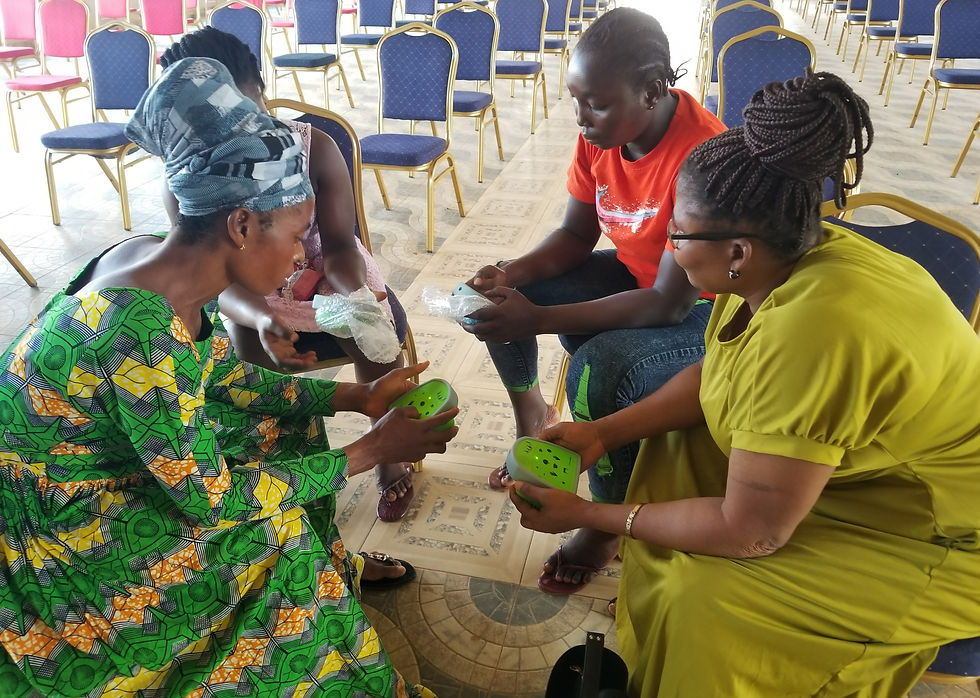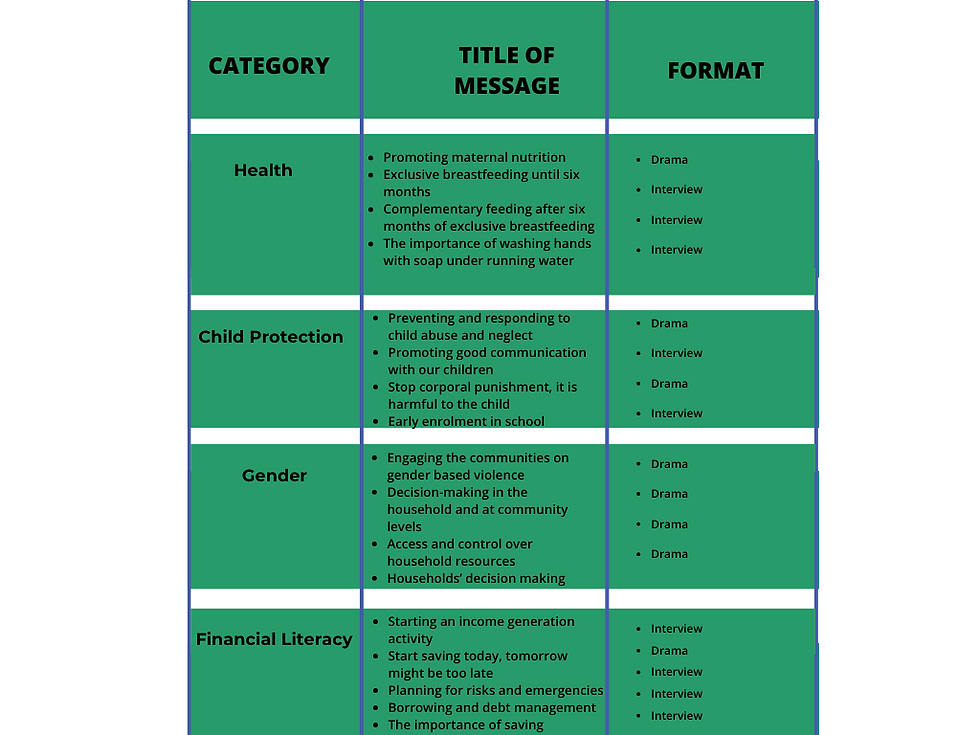Creating Sustainable Change for Families with CARE’s Women for Change Program
- Thelma Anike

- Mar 8, 2024
- 4 min read
CARE Ghana, through a partnership with Amplio Ghana brings a digital innovation - Amplio Talking Books, to Women and their families in cocoa growing communities.
CARE’s Women for Change (W4C) Project with funding from Mars Wrigley spans from October 2020 to September 2025 with the overall objective of expanding the village savings and loan initiative in Mars' supplier cocoa communities to strengthen financial literacy, household savings, and income-generating activities for women.
The project helps to unlock the economic power of cocoa farmers, especially women and their households by increasing their participation in community development, decision making, and business and livelihood management. To further promote thriving cocoa-growing communities, CARE also works to improve nutrition, child protection, and education on sexual and reproductive health and rights for individuals.
In Ghana, Amplio partnered with CARE through the Women for Change project to pilot the use of the Amplio Talking Book as a digital tool to support its Healthy Families training. Approximately 25% of cocoa farmers in Ghana are women striving to support their families. The project used Amplio Talking Books to deliver training in local languages, facilitate group and household learning and discussion, and collect usage data and user feedback.
With an overall goal of improving women’s economic status, the training covered a range of topics, including financial literacy, gender roles, child protection, health, and nutrition. The Talking Books collect both qualitative and quantitative data. The qualitative data involves feedback provided by women farmers including; questions, comments, complaints or endorsements. Quantitative data on the other hand is the usage statistics on how the farmers have utilized the content that is tracked by the device.
For this project, Talking Books were distributed to 50 Village Savings and Loans Association (VSLA) groups in four districts in the Bono and Ahafo regions. The women listened to messages together during their regular VSLA meetings and took turns borrowing the devices to listen with their families.
CARE’s Women for Change Talking Book pilot was conducted from December 2021 to August 2022, reaching 5000 women VSLA participants and their families.

The Research phase - Formative research
At the project start, Amplio conducted research to understand the target groups and communities of the CARE Women for Change Project. The team used this research to shape the training content, considering factors like language preferences, message formats, voice preferences, and strategies for message capture.
”For example, some communities, particularly those in close proximity to a dam, requested information on how to cultivate okro and acquire equipment for large- scale okro farming. In their region, okro is among the most profitable crops to cultivate due to its scarcity,” shared Toffic Dapilaah, Amplio’s MEAL officer who led the project.
Women also expressed a desire for further education and information regarding cocoa pricing calculations, the identification of high-quality cocoa beans, and techniques for measuring the weight and determining the price of their cocoa produce.
Sharing targeted content in the community’s local language
Based on the formative research, Amplio and CARE Ghana crafted the content scripts, producing messages in expert interview and audio drama formats. The messages and Talking Book’s audio system prompts—which help guide users with low literacy—were recorded in Asante Twi, the language spoken widely in both regions. Over the course of the project, Talking Book usage statistics showed the most popular messages were child protection, health, financial literacy, and gender messages. The table below shows a list of some of the messages recorded.

Engaging men to improve women’s economic empowerment
While most of VSLA members are women, they also borrowed Talking Books to listen to with their households. This gave their husbands an opportunity to engage with the content, too, leading to new knowledge, attitudes, and behavior change.
“It’s important to include men in the conversation when you’re working to shift behaviors for gender equality and women’s economic empowerment—and the Amplio Talking Book helps with that,” Toffic said. “Men are interested in the technology as well, and they pay great attention to the content.”
For example, prior to the Talking Book pilot, cocoa farmer Madam Dorcas and her husband, Mr. Anane, previously made independent decisions, leading to financial inefficiencies. After the Talking Book was introduced, Mr. Anane, for the first time, shared the earnings from selling cocoa beans with his wife, seeking her input on how to use the money wisely. This marked a positive shift in their communication, driven by the insights gained from the Talking Book messages. Inspired by the change, Madam Dorcas encouraged others in her community to listen to the messages, emphasizing the potential benefits for their households.
"According to Madam Dorcas, this positive change in their communication continued after they had listened to the messages," Toffic mentioned.
Project key takeaways/ lessons and outcome
The project was supported by group promoters who then facilitated discussions around what participants have heard through the ‘Talking Book’. This ensures that sensitive training is delivered consistently across the project.
According to CARE, digitalization was particularly helpful during lengthy COVID-19 lockdowns, because the Talking Book could be passed from one household to the next without the requirement for in-person meetings. The Talking Books saw exceptionally high listenership and feedback from the VSLA groups during this project.
“CARE selected the Talking Book to improve message quality, message reach, and the adoption of recommended practices and behaviors. Because of the 10-year shelf life, CARE is also evaluating the Talking Book as a sustainable ICT solution that can be deployed again and again for other projects,” Toffic said. “CARE intends to reuse Talking Books for a future Nutrition project. This continued deployment reflects well on the tools flexibility.”
About CARE Ghana
CARE Ghana works with communities in 150 districts across the country to increase food and nutrition security and resilience to the climate emergency. CARE International also works to help empower women and girls socially and economically, and respond to crises with life-saving humanitarian assistance.



